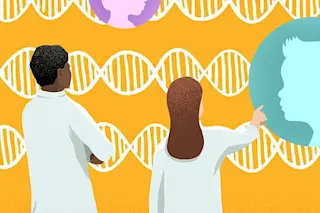The seizures started when Samantha Gundel was just four months old. By her first birthday, she was taking a cocktail of three different anticonvulsant medicines. A vicious cycle of recurrent pneumonia, spurred on by seizure-induced inhalation of regurgitated food, landed the young toddler in and out of the hospital near her Westchester County home in New York State.
Genetic testing soon confirmed her doctors’ suspicions: Samantha, now age 4, has Dravet syndrome, an incurable form of epilepsy. Her brain was misfiring because of a mutation that is unlike those responsible for most genetic diseases; it’s a type that has long eluded the possibility of correction. Available drugs could help alleviate symptoms, but there was nothing that could address the root cause of her disease.
That’s because the mutation at the heart of Dravet creates a phenomenon known as haploinsufficiency, in which a person falls ill if they have only a ...














